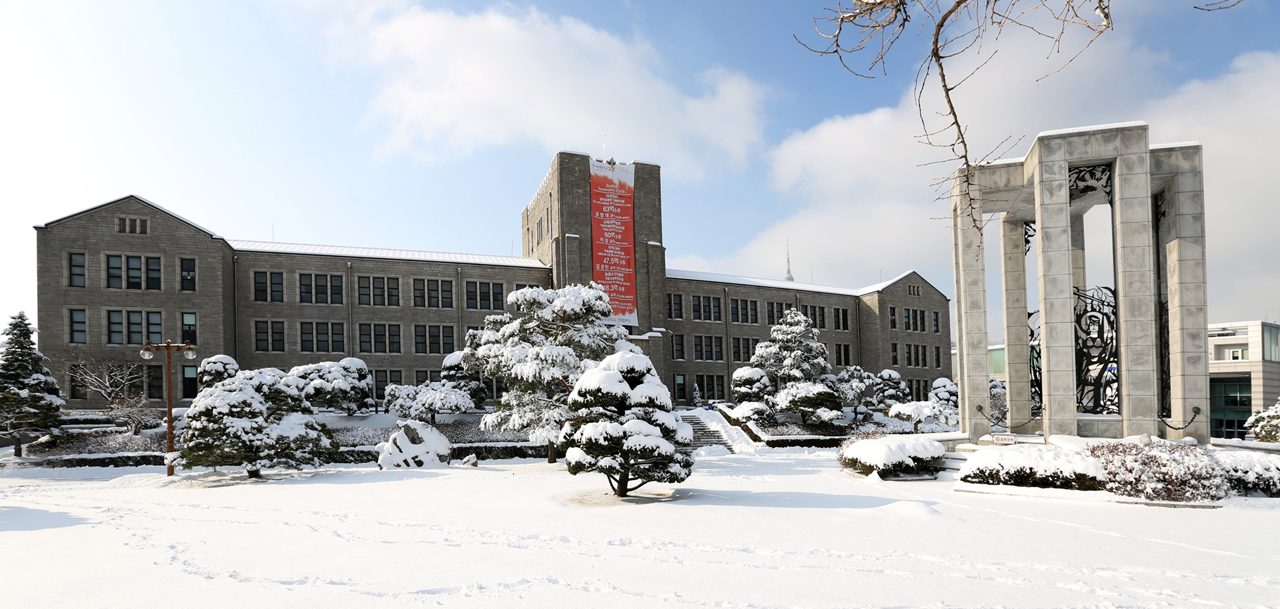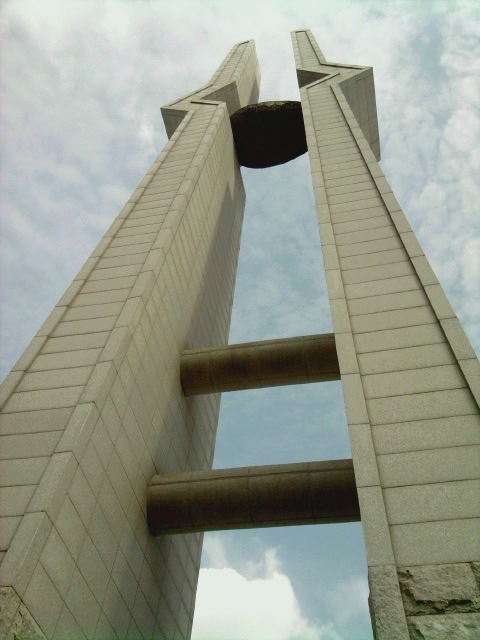|
Choi Geum-jin
Choi Geum-jin (Hangul 최금진; born 1970) is a South Korean poet. He is known for his straightforward portrayal of poverty and marginalization using humor and satire. Born in Jecheon, South Korea, he graduated from Chuncheon National University of Education. He went onto earn his master's and doctoral degrees for Korean language and literature at Hanyang University. In 2008, he won the inaugural Oh Jang-hwan Literature Prize. He has lectured at various institutions including Dongguk University and Kyung Hee Cyber University, and currently teaches at Gwangju University and Hanyang University. Life Choi Geum-jin was born in Jecheon, South Korea in 1970. His grandfather, grandmother, and cousins took their own lives or suffered premature deaths. His father, drunk, jumped into a river and drowned when he was three. He has often alluded to his tragic family history in his poetry. After graduating from Chuncheon National University of Education, he worked at an elementary school for ei ... [...More Info...] [...Related Items...] OR: [Wikipedia] [Google] [Baidu] |
Hangul
The Korean alphabet, known as Hangul, . Hangul may also be written as following South Korea's standard Romanization. ( ) in South Korea and Chosŏn'gŭl in North Korea, is the modern official writing system for the Korean language. The letters for the five basic consonants reflect the shape of the speech organs used to pronounce them, and they are systematically modified to indicate phonetic features; similarly, the vowel letters are systematically modified for related sounds, making Hangul a featural writing system. It has been described as a syllabic alphabet as it combines the features of alphabetic and syllabic writing systems, although it is not necessarily an abugida. Hangul was created in 1443 CE by King Sejong the Great in an attempt to increase literacy by serving as a complement (or alternative) to the logographic Sino-Korean ''Hanja'', which had been used by Koreans as its primary script to write the Korean language since as early as the Gojoseon period (spanni ... [...More Info...] [...Related Items...] OR: [Wikipedia] [Google] [Baidu] |
Jecheon
Jecheon () is a city in North Chungcheong Province, South Korea. The city is a major railway junction or a transportation mecca, served by the Jungang, Chungbuk and Taebaek Lines. Jecheon has scenic surroundings and several tourist spots like the Uirimji Reservoir, Cheongpung Lake and Cheongpung Cultural Properties complex. It is also the home of Semyung University. The city's name derives from the Korean words ''je'' (, which means "dam") and ''cheon'' (, which means "river"). Location Jecheon City is located in the northern part of North Chungcheong Province bordering Mungyeong City to the south, while Wonju City and Yeongwol-gun, which are located in Gangwon Province, are to the north. It is well known for its mountains and lake environments. Jecheon is well known as the "healing city". A wide variety of traditional medical and herbal products and therapies are available, attracting people all over Korea to visit the city. Climate Jecheon has a monsoon-influenced humid cont ... [...More Info...] [...Related Items...] OR: [Wikipedia] [Google] [Baidu] |
Chuncheon National University Of Education
Chuncheon National University of Education is one of the 10 national universities of education in South Korea. It provides training to future educators, primarily those bound for the primary level of the country's public education system. The campus is located in Chuncheon City, the capital of Gangwon province in the country's northeast. 1,294 undergraduate students and 371 graduate students are enrolled as of 1 April 2022. The current president is JuHan Lee(이주한). Academics CNUE offers focused instruction in each of the main content areas of the public-school curriculum. In addition, the graduate school offers master's degrees in each of these fields. CNUE’s various academic departments offer 12 undergraduate programs, all of which consist of 141 units of course weight and 8 weeks of practicum. Upon completing the programs, students will earn a Bachelor of Education degree and elementary school teacher certification. CNUE has a two-semester system with the first term beg ... [...More Info...] [...Related Items...] OR: [Wikipedia] [Google] [Baidu] |
Hanyang University
Hanyang University (Korean: 한양대학교) is a private research university in South Korea. The main campus is located in Seoul and its satellite campus, the Education Research Industry Cluster (ERICA campus), is in Ansan. ''Hanyang'' (한양, 漢陽) derives from the former name of the capital Seoul used during the Joseon Dynasty. The university was established in 1939 as an engineering school. Hanyang university was the country's first college to offer engineering and architecture programs, and is consistently ranked among the leading universities in STEM fields nationally. Hanyang University enrolls over 3,000 international students each year, and sends more than 3,300 students on study abroad programs annually. , Hanyang University had 777 partner universities in 76 countries. History Hanyang University was founded as Dong-A Engineering Institute on July 1, 1939, during the Japanese occupation of Korea. Dong-A Institute started with 630 students and 35 faculty in Jongno ... [...More Info...] [...Related Items...] OR: [Wikipedia] [Google] [Baidu] |
Dongguk University
Dongguk University (Korean: 동국대학교, Hanja: 東國大學校) is a private, coeducational university in South Korea, fundamentally based on Buddhism. Established in 1906 as Myeongjin School (명진학교; 明進學校) by Buddhist pioneers of the Association of Buddhism Research (불교연구회; 佛敎硏究會), the university gained full university status as Dongguk University in 1953. The university remains one of the few Buddhist-affiliated universities in the world, and is a member of the International Association of Buddhist Universities. Situated on a hill near Namsan, the university's Seoul campus is in the urban Jung-gu District of central Seoul. The university's symbol animal is an elephant, which stemmed from Queen Māyā of Sakya's precognitive dream of a white elephant about the birth of The Buddha, and the symbol flower is a lotus blossom which reflects the Buddhist truth. Dongguk University Seoul campus is organised into 127 undergraduate and graduate sc ... [...More Info...] [...Related Items...] OR: [Wikipedia] [Google] [Baidu] |
Kyung Hee Cyber University
Kyung Hee Cyber University (abbreviated to KHCU) () is a virtual, South Korean higher education institution that offers online bachelor's and master's degree programs. Founded in 2001, it has been recognized as the best cyber university in South Korea by both the Ministry of Education and the Korea Management Association. Kyung Hee Cyber University is part of the Kyung Hee University System which offers comprehensive education from kindergarten through graduate school. The cyber university along with the programs it offers were constructed based on the tradition and knowledge of Kyung Hee University (KHC), a private higher education institution with over 70 years of history and expertise. History Kyung Hee Cyber University was established on March 3, 2001 as the first online initiative by the Kyung Hee University System. In 2018, Kyung Hee Cyber University was awarded the grand prize in online education at the 2018 Korea Customer Satisfaction & Power Brand Awards. Academics D ... [...More Info...] [...Related Items...] OR: [Wikipedia] [Google] [Baidu] |
Gwangju University
Gwangju University began in 1981 as a four-year college in Jinwol-dong, Nam-gu, Gwangju, named Gwangju Gyeongsang Jeonmun Daehak (). It now has three graduate schools and four colleges with more than fifteen thousand students.Gwangju University, "About Gwangju: University History" (Gwangju: Gwangju University, 2005), http://www.gwangju.ac.kr/english/ Notable people *Kim Na-woon Kim Na-woon (born May 11, 1970) is a South Korean actress. She made her acting debut in 1987, and is most active as a supporting actress in television dramas. Filmography Television series Film Variety/radio show Music video ..., actress * K.J. Choi, professional golfer Notes External links * * {{authority control Educational institutions established in 1981 Universities and colleges in Gwangju Nam District, Gwangju 1981 establishments in South Korea ... [...More Info...] [...Related Items...] OR: [Wikipedia] [Google] [Baidu] |
Gwangju
Gwangju () is South Korea's sixth-largest metropolis. It is a designated metropolitan city under the direct control of the central government's Home Minister. The city was also the capital of South Jeolla Province until the provincial office moved to the southern village of Namak in Muan County in 2005 because Gwangju was promoted to a metropolitan city and was independent of South Jeolla province. Its name is composed of the words ''Gwang'' () meaning "light" and ''Ju'' () meaning "province". Gwangju was historically recorded as ''Muju'' (), in which "Silla merged all of the land to establish the provinces of Gwangju, Ungju, Jeonju, Muju and various counties, plus the southern boundary of Goguryeo and the ancient territories of Silla" in the ''Samguk Sagi.'' In the heart of the agricultural Jeolla region, the city is also famous for its rich and diverse cuisine. History The city was established in 57 BC. It was one of the administrative centers of Baekje during the Three ... [...More Info...] [...Related Items...] OR: [Wikipedia] [Google] [Baidu] |
Living People
Related categories * :Year of birth missing (living people) / :Year of birth unknown * :Date of birth missing (living people) / :Date of birth unknown * :Place of birth missing (living people) / :Place of birth unknown * :Year of death missing / :Year of death unknown * :Date of death missing / :Date of death unknown * :Place of death missing / :Place of death unknown * :Missing middle or first names See also * :Dead people * :Template:L, which generates this category or death years, and birth year and sort keys. : {{DEFAULTSORT:Living people 21st-century people People by status ... [...More Info...] [...Related Items...] OR: [Wikipedia] [Google] [Baidu] |
People From Jecheon
A person ( : people) is a being that has certain capacities or attributes such as reason, morality, consciousness or self-consciousness, and being a part of a culturally established form of social relations such as kinship, ownership of property, or legal responsibility. The defining features of personhood and, consequently, what makes a person count as a person, differ widely among cultures and contexts. In addition to the question of personhood, of what makes a being count as a person to begin with, there are further questions about personal identity and self: both about what makes any particular person that particular person instead of another, and about what makes a person at one time the same person as they were or will be at another time despite any intervening changes. The plural form "people" is often used to refer to an entire nation or ethnic group (as in "a people"), and this was the original meaning of the word; it subsequently acquired its use as a plural form of per ... [...More Info...] [...Related Items...] OR: [Wikipedia] [Google] [Baidu] |


_1938.jpg)